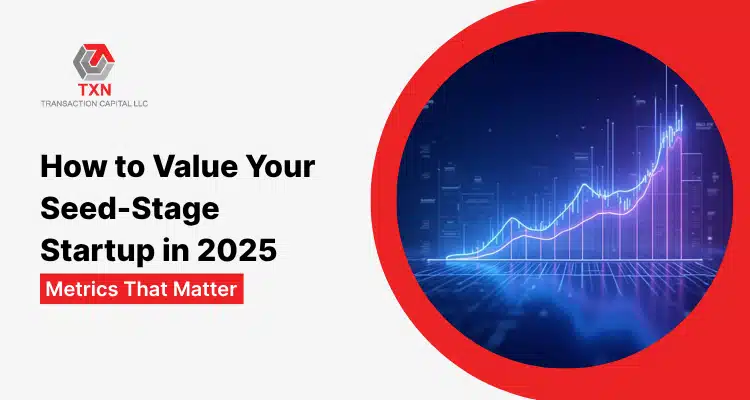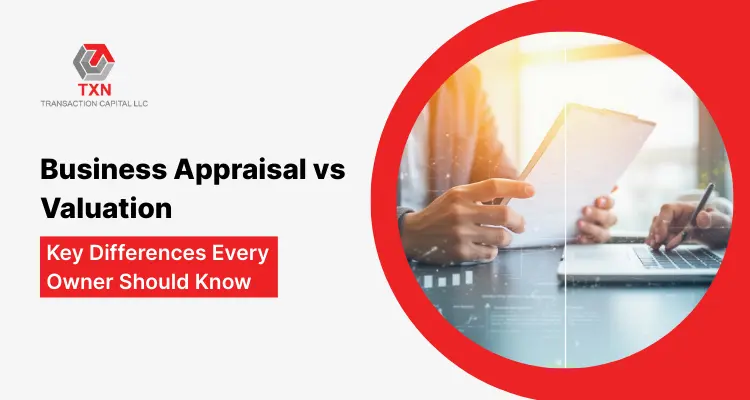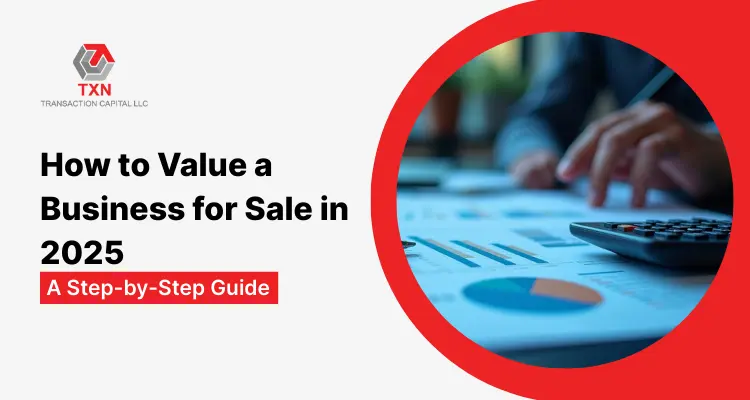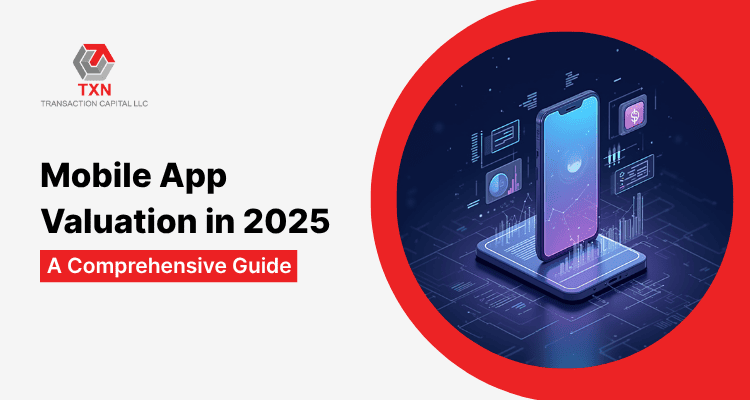How to Value Your Seed-Stage Startup in 2025: Metrics That Matter

Determining your startup’s true worth has never been more critical—or more complex. With investors demanding data-driven valuations and regulatory requirements tightening around equity compensation, today’s founders need professional-grade valuation strategies that go far beyond back-of-the-napkin estimates.
This comprehensive guide reveals the exact methodologies, metrics, and insider insights that successful startups use to secure higher valuations, attract serious investors, and maintain compliance.
Whether you’re preparing for your first funding round, implementing employee stock options, or planning an eventual exit, you’ll discover proven frameworks that transform valuation from guesswork into strategic advantage.
Why Does Startup Valuation Matter in 2025?
Your innovative concept is ready for launch. You’ve developed a working prototype, generated initial user interest, and potentially brought a co-founder into the fold. But the critical question remains: what’s your startup’s actual market value?
By 2025, startup valuation has undergone a complete transformation from intuitive guesswork to precise, data-driven methodologies. Today’s discerning investors require audit-defensible valuations, cap tables undergo rigorous examination, and equity-related decisions demand professional verification.
Whether you’re initiating a pre-seed investment round, establishing compliant employee stock option pricing through 409A valuations, or strategizing for potential merger and acquisition opportunities, your valuation serves as the foundation for every crucial business decision.
Your valuation influences equity allocation, molds investor perspectives, and charts your company’s growth trajectory. Professional startup valuation services have become indispensable for establishing credibility and maintaining regulatory compliance in today’s competitive marketplace.
Ready to establish your startup’s value with confidence?
Schedule your consultation today!
What Is Seed-Stage Startup Valuation?
Seed-stage valuation represents your startup’s fair market value (FMV) assessment, typically calculated before substantial revenue generation or significant market penetration. Unlike established enterprises that depend on EBITDA multiples or performance history, seed valuations concentrate entirely on future potential and risk evaluation.
Primary valuation factors encompass:
- Founding team capabilities and proven track record
- Total addressable market (TAM) scale and expansion potential
- Product innovation and technological differentiation
- Business model viability and revenue generation clarity
- Intellectual property portfolio and competitive barriers
- Early customer validation and market traction evidence
Why precise valuation is crucial:
- Controls equity dilution throughout funding cycles
- Creates IRS-compliant employee stock option pricing frameworks
- Establishes benchmarks for future M&A or IPO assessments
- Showcases professional preparedness to potential investors
When Do You Need Professional Startup Valuation?
Immediate valuation needs:
- Launching any priced funding round (Pre-Seed through Series C)
- Implementing employee stock option plans (409A compliance required)
- Exploring merger, acquisition, or strategic partnership opportunities
- Conducting comprehensive financial planning or tax optimization
- Demonstrating transparency during investor due diligence processes
Professional business valuation services protect your startup legally and financially while establishing credibility with sophisticated investors and regulatory bodies.
What Are the Most Effective Startup Valuation Methods in 2025?
1. Comparable Company Analysis
This market-based approach benchmarks your startup against similar ventures by analyzing stage, sector, geography, and business model characteristics.
Example: If three AI startups with comparable prototypes raised funding at $8M post-money valuations, your startup likely falls within that range.
Advantages: Market-validated and investor-friendly Limitations: Finding true apples-to-apples comparisons proves challenging
2. Reverse Engineer Valuation from Funding Requirements
This practical methodology aligns valuation with capital needs and acceptable dilution levels.
Formula: If raising $1.2M while offering 20% equity = $6M post-money and $4.8M pre-money valuation.
This approach frequently guides founder-investor negotiations and provides realistic valuation frameworks.
3. Venture Capital (VC) Method
VCs estimate your potential exit value and calculate backward using target return multiples.
Formula: Current Valuation = Projected Exit Value ÷ Expected Return Multiple
Example: $120M projected exit ÷ 12x target return = $10M maximum current valuation
4. Berkus Method
This systematic approach allocates specific values to five critical risk-mitigation factors:
| Innovative Concept |
$1M |
|---|---|
| Working Prototype | $500K |
| Quality Management Team | $1M |
| Strategic Relationships | $500K |
| Product Sales/Rollout | $1M |
| Total Potential Valuation | $4M |
Ideal for pre-revenue startups without substantial financial information.
5. Scorecard Method
This methodology compares your venture against regional benchmark enterprises, adjusting for:
- Management team expertise and completeness
- Market opportunity scale and growth potential Pre-revenue seed-stage companies without financial historyNeed expert guidance on the right method for your startup?
Schedule your free consultation now →What Metrics Do Investors Actually Examine in 2025?
Even without revenue generation, sophisticated investors seek specific validation signals that minimize investment risk.
Founding Team Excellence Is Critical
The appropriate team composition can multiply your valuation by 10x or more.
Critical insight: Studies demonstrate that 60% of startup failures originate from team-related challenges, making team evaluation a primary valuation factor.
Investors evaluate:
- Previous startup experience and successful exit history
- Domain expertise and technical competencies
- Leadership abilities and execution track record
- Team chemistry and complementary skill combinations
Market Opportunity Scale That Attracts Investors
Your Total Addressable Market (TAM) should surpass $1 billion, with preference for rapidly expanding or underserved market segments.
Winning characteristics:
- Annual market growth rates exceeding 20%
- Limited dominant competitors or outdated solutions
- Clear pathway to significant market share acquisition
Demonstrating Product-Market Fit Early
Strong validation indicators include:
- Active beta user engagement or substantial waitlist development
- Customer retention rates surpassing 70% monthly
- Net Promoter Score (NPS) exceeding 30
- Organic referrals and positive user testimonials
Financial Discipline Metrics That Matter Most
Key performance indicators:
- Customer Lifetime Value to Customer Acquisition Cost (LTV:CAC) ratio of 3:1 or higher
- 12-18 months operational runway following funding round
- Reasonable burn rate with clear profitability pathway
Building Defensible Competitive Advantages
Sustainable moats include:
- Patent portfolio or proprietary technology
- First-mover advantage in emerging markets
- Unique data assets or algorithm superiority
- Regulatory barriers or compliance requirements
- Network effects or platform dynamics
What Are the Biggest Startup Valuation Challenges in 2025?
Common obstacles founders face:
- Absence of revenue benchmarks for comparison
- Market volatility affecting investor sentiment
- Over-reliance on optimistic growth projections
- Overvaluation risks leading to future down rounds
- Regulatory compliance requirements for equity issuance
Solution: Professional valuation combines quantitative analysis with market positioning and regulatory compliance expertise.
Key Differences Between VC Valuations and 409A Fair Market Value
Factor
VC Valuation 409A FMV Primary Purpose Maximize fundraising proceeds IRS tax compliance Stock Class Focus Preferred shares Common shares Liquidity Assumptions Expected future exit Illiquid until realization Methodology Approach Market-optimized Conservative, audit-led Regulatory Requirements Investor-focused IRS/SEC compliant Key insight: Different valuation purposes require different methodologies and professional expertise.
Considering SAFEs and Convertible Notes as Alternatives
For early-stage startups not ready for formal valuation, alternative funding instruments offer flexibility.
Simple Agreement for Future Equity (SAFE) advantages:
- No immediate valuation requirement
- Faster execution and reduced legal costs
- Simplified cap table management initially
Potential drawbacks:
- Future dilution uncertainty
- Cap table complexity in subsequent rounds
- Limited investor protection mechanisms
Popular among accelerator graduates and pre-product teams raising on momentum and team credibility.
Seed Investor Priorities in 2025
Investment criteria hierarchy:
- Problem-Solution Fit – Clear market pain point with unique solution approach
- Team Quality – Relevant experience, execution capability, founder-market fit
- Go-to-Market Strategy – Realistic, actionable customer acquisition plan
- User Validation – Genuine engagement metrics, even without monetization
- Exit Potential – Clear IPO or acquisition pathway within 5-7 years
Current Seed Valuation Benchmarks by Region
Region
Typical Seed Valuation (Post-Money) Silicon Valley $5M–$12M NYC / Boston $4M–$10M Midwest / South $3M–$8M India ₹8–₹20 Cr Europe €1.5M–€4M How Can You Maximize Your Startup Valuation?
Proven value-enhancement strategies:
- Increase active user engagement while reducing churn rates
- Secure pilot customers, letters of intent, or early revenue commitments
- File provisional patents or establish intellectual property protection
- Clarify monetization strategy with realistic revenue projections
- Strengthen management team with industry veterans
- Diversify customer acquisition channels and reduce dependency risks
Every risk-reduction initiative builds investor confidence and supports higher valuation multiples.
Ready to maximize your startup’s value? Connect with certified valuation experts →
Protect Your Cap Table with Professional 409A Valuation
Your startup’s valuation foundation is too critical for approximation. Professional valuation experts deliver audit-ready, investor-trusted pricing from certified professionals who understand your industry dynamics.
Schedule your FREE consultation to discuss your seed-stage startup valuation requirements. Our certified professionals will evaluate your business model, market opportunity, and traction stage to recommend the most effective valuation methodology.
Ready to move forward with confidence? Consult with our certified valuation experts and secure a valuation that withstands investor scrutiny and regulatory standards.
Why Choose Transaction Capital LLC for Your 409A Valuation?
Transaction Capital LLC operates as a national leader in 409A and startup business valuations, serving founders, attorneys, and venture capitalists throughout 35+ industry sectors. Our certified team delivers comprehensive valuation reports that satisfy investor due diligence requirements and IRS audit standards while supporting your growth and fundraising objectives.
Certified Valuation Expertise You Can Trust
Our team possesses the industry’s most prestigious valuation credentials:
- ABV® (Accredited in Business Valuation) – AICPA
- ASA (Accredited Senior Appraiser) – American Society of Appraisers
- MRICS – Royal Institution of Chartered Surveyors
- CVA® (Certified Valuation Analyst) – NACVA
Frequently Asked Questions:
1. What constitutes startup valuation and why is it essential for early-stage companies?
Startup valuation establishes a company’s fair market value, particularly crucial during early development phases. It directly influences equity allocation during fundraising, establishes baselines for employee stock options (409A compliance), and shapes investor perception. Professional valuation ensures IRS compliance, builds investor trust, and enables accurate financial planning for sustainable growth.2. When should an early-stage startup obtain professional valuation services?
Startups require professional valuation during several critical milestones: launching priced funding rounds (Seed through Series A), implementing employee stock option programs (409A compliance), preparing for merger or acquisition discussions, conducting financial reporting or tax planning, and structuring equity arrangements for founders, employees, or strategic partners.
3. What valuation methodologies work best for seed-stage startups in 2025?
Effective seed-stage methodologies include Comparable Company Analysis for market benchmarking, Venture Capital Method for investor-aligned calculations, Scorecard and Berkus Methods for pre-revenue assessment, and reverse engineering from funding requirements. Professional valuators often combine multiple approaches for comprehensive accuracy and regulatory compliance.
4. How do investors evaluate startup valuations during due diligence?
Sophisticated investors examine market size and growth trajectory, founding team experience and execution capability, product-market fit evidence or early traction signals, business model scalability and monetization clarity, competitive landscape positioning, and overall risk profile assessment. Professional valuation documentation significantly enhances investor confidence during this critical evaluation process.
5. What’s the distinction between pre-money and post-money valuation calculations?
Pre-money valuation represents your company’s worth before new investment capital injection. Post-money valuation equals pre-money value plus newly raised capital. This distinction directly affects investor equity percentages and founder dilution. Understanding both calculations ensures accurate negotiations and proper cap table management throughout fundraising processes.
6. Can I secure capital without establishing a formal valuation?
Yes, many early-stage founders utilize SAFEs (Simple Agreements for Future Equity) or convertible notes to secure funds before formal valuation. This approach defers valuation decisions to later funding rounds when the company has more traction and data. However, these instruments still convert based on future valuations, so understanding valuation principles remains crucial.
7. What constitutes a 409A valuation and why is it legally required?
A 409A valuation establishes the fair market value of your common stock for issuing employee stock options. It ensures IRS compliance, prevents tax penalties for employees, and protects both the company and option recipients. The IRS requires 409A valuations to be conducted by qualified independent appraisers and updated at least annually or after material events.
8. What factors most significantly influence valuation accuracy?
Key factors include market size and industry growth trends, intellectual property strength and defensibility, founding team experience and track record, product development stage and user traction, revenue model clarity and scalability potential, competitive landscape positioning, and overall business risk assessment. Professional valuators analyze these comprehensively.
9. How can I strategically increase my startup’s valuation?
Build a strong, experienced management team with relevant industry expertise. Demonstrate clear product traction through user engagement metrics. Secure letters of intent, pilot customers, or early revenue commitments. Reduce burn rate and improve key financial metrics. Register intellectual property or patents to establish defensibility. Diversify customer acquisition channels to reduce dependency risks.
10. Why should I choose a certified valuation firm like Transaction Capital LLC?
Certified firms ensure complete IRS and SEC compliance (409A, USPAP, AICPA-SSVS), deliver accurate and defensible audit-ready reports, use trusted methodologies for fundraising and M&A purposes, provide investor confidence during due diligence processes, and offer ongoing support during audits and regulatory reviews. Professional credentials protect your startup legally and financially.



